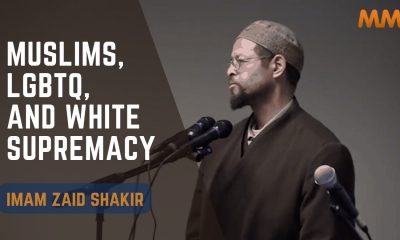The Muslim community has experienced a wave of intellectual revival of faith in the last five to ten years. More and more Muslims are re-introducing themselves to Islam in various capacities of their lives. Through a combined glance at American history, traveling preachers, and revolutionized clergy, we will examine how faith was revived in the lives of the colonists living in America in the 1700s. We will also compare how the Muslim community is experiencing a comparable revival today in a very similar fashion.
A Historical Perspective
Traveling scholars play a vital role in refreshing the faith of Muslims living in the American and European landscape. In understanding how faith is learned and practiced in this country, a brief study of the Great Awakening[1] (1725-1750) in colonized America will show us that Christianity was revived as a faith through a series of traveling preachers who taught a message of binding together, regardless of denomination, and reaching out to those who were not directly involved in the faith community. This was the pre-movement that prepared America for the official revolution in 1776, by fueling the will-power of the colonists to fight for their freedom and laying the foundations of Evangelism as a predominant denomination of Christianity.
The Great Awakening came at a time when preaching was done in a spontaneous fashion, without regard to motivate. Dense theology was taught, along with academic opinions of the old, on subjects that did not affect the masses. Due to the combination of the two points above, the masses had gradually begun to drift away from Christianity as a faith. Though there were many preachers that took part in the Great Awakening, George Whitefield was of the first to direct his message to the general masses through styles of emotion and vigor while preaching the message of the Bible in a rhetoric and manner everyone understood. Benjamin Franklin noted that when Whitefield came to Philadelphia to preach, over thirty-thousand people were in attendance at his sermon. In a short period of fifteen months, Whitefield had traveled over five thousand miles and had preached over one hundred times to more than a quarter of the country. The importance of the likes of Whitefield and his message was evident in that people were no longer interested in hearing any message of faith from their local churches or tenured clergy members. Eventually, after traveling for some years, the traveling preachers revolutionized churches throughout the country and produced clergy with a new focus towards using faith to effectively empower the masses.
Importance of Traveling Scholars in the Muslim Community
Keep supporting MuslimMatters for the sake of Allah
Alhamdulillah, we're at over 850 supporters. Help us get to 900 supporters this month. All it takes is a small gift from a reader like you to keep us going, for just $2 / month.
The Prophet (SAW) has taught us the best of deeds are those that done consistently, even if they are small.
Click here to support MuslimMatters with a monthly donation of $2 per month. Set it and collect blessings from Allah (swt) for the khayr you're supporting without thinking about it.
Without a doubt, scholars that travel have had a profoundly positive effect on the faith and morale of the Muslim community. We should harness the influence and expertise of traveling scholars instead of pushing them away and being overly critical towards them, solely due to their lacking alignment to one specific congregation. For those not directly connected to a mosque, traveling scholars may be the only link left between “non-congregationalist” Muslims and Islam.
Just as the colonists that settled in the New World had a faith restoration through traveling clergy, it is important to note that a similar awakening is and has been taking place at a macro level in the Muslim community, through the speeches and classes of traveling scholars. They have been blessed with the opportunity of bringing a beautiful and enlightening faith-experience to hundreds of Muslim communities throughout the world. By simply glancing at the thousands (and in some cases, millions) of likes, fans, and views on social media platforms, it is an indisputable fact that traveling scholars have the ear of most Muslims throughout the world. Imams and scholars seeking to enrich their da’wah should consider traveling the country and providing their expertise in education to the greater Muslim community. This will help them get a better pulse of the community and better elate the faith of the masses, while also preparing themselves as Muslim leaders who specialize in a specific direction when the time comes to settle down in one community.
Lasting Faith Occurs through Institutionalization
It is important to note that the traveling clergy of the Great Awakening eventually settled in one congregation after the faith revolution had been set in motion. Being effective in an established manner in their ministry required eventually settling down with a congregation. With the vast amount of settled Western Muslim communities in urban and suburban neighborhoods, the role of the Imam/Resident Scholar has never been more in demand than today. It is important to understand our need for sustained scholarship to mature spiritually, academically, and mentally as a religious community in America. Though traveling scholars provide the fundamental framework of faith for Muslims in their individual communities, local scholarship will be the means to develop and nurture the faith of the common Muslim. Without on-the-ground, accessible, and authentic institutionalized scholarship, it is difficult to develop communities deeply rooted in the spiritual and intellectual framework of Islam.
Understanding Long-Term and Short-Term Persuasion
From a Social Psychology perspective, to change attitudes and mindsets one must execute one of two routes of persuasion: 1) central 2) peripheral. The central route is based on facts, logic, critical thinking, and elaborate arguments, while the peripheral route is based on certain cues and surface characteristics, such as the prestige of the person disseminating the information. When the matter is relevant to them, people are more influenced by the central route, but when it is not relevant, the peripheral route suggests a greater impact, simply through the command of the speaker and his/her expertise.
In regards to long-term attitude change, the central route of perception is successful in creating a lasting effect through discussion about the arguments presented. Though the peripheral route serves an important purpose in the initial phase of making the situation relevant, it will not be able to bring lasting attitude change in the audience it is targeting. Achieving that change will require the persuader to switch to a central mode of teaching. In conclusion, traveling speakers will ignite the initial flame of desire to learn one’s religion through peripheral routes of persuasion, but sustaining and growing that faith will happen from institutionalized scholarship through central routes of persuasion.
Conclusion
Though there is much more that can be written on this subject, as a growing community it will be very helpful to navigate our narrative in a positive direction. By understanding the history of how faith came to fruition in the United States, we will get a better understanding of similar methodologies of teaching Islam to the masses. Instead of criticizing an Imam for traveling every weekend versus being tenured at a mosque, or vice versa, we need to understand where our strengths lie and serve the Muslim community accordingly. Nurturing the Muslim community is a team effort for sure, not an individualistic one. Putting (not bumping) our heads together and working as one will bring the maximum amount of benefit to our communities.
[1] The Great Awakening generally refers to several time periods where faith was revived among the masses. For the sake of this article, I have focused only on the first awakening.
















Sara
August 5, 2014 at 2:36 AM
interesting insights
thanks for sharing
Nihal Khan
August 5, 2014 at 2:41 AM
Thank you Sara!
Dawud Israel (@DawudIsrael)
August 6, 2014 at 12:59 PM
Salam,
Thanks for the piece Nihal. Ma sha Allah, academic hafiz. :)
We kind of already have traveling scholars – visiting scholars in Ramadhan, Tablighi Jamaat, wandering Qalandars back in the day. Traveling salihin/ulema bring new perspectives – each Muslim culture has its own wise sayings, its own proverbs, its own lessons from their history, its own strategies and solutions for practicing the deen. Sharing and circulating that “collective ummah wisdom” requires time and patience and an open mind.
Consider differences between Christian preacher/Muslim scholar just looking at sermon content. Christian sermons are moralistic and easy to deliver but Muslim sermons require religious quotations that are repeated often. By the time congregants are seniors, they have memorized much of what you have to say. Mufti Abdur-Rahman ibn Yusuf tweeted, “Khutba Challenge: Speaking to older folk is easy, they are happy to hear what they already know. The young want a more challenging discourse.” That’s a hard balancing act. There is a lot of social psychology that happens but most of it is emotional and tone – we like to think we are intellectual but its a lot of cognitive biases (see: http://en.wikipedia.org/wiki/List_of_cognitive_biases).
Muslim sermons are highly geopolitical, critical and about everything and anything, so its hard to really delve and focus intensely on one topic, unless there are other interests or agendas at play. Usually khutba topics are chosen from recent contemporary issues to keep people interested but then it is just making dhikr of the dunya on the minbar. Doesn’t help much…
Also I think the historical period you are talking about, English rhetoric and education in America was pretty strong. Muslim English skills today by comparison are pretty abysmal – if you are eloquent, people won’t understand you and if you talk very plain English you lose some of the content of the message. Bayaans should expand the Muslim vocabulary of righteousness, not limit it. So a strong command of English is a must.
Slightly related, I wrote something on some Muslim bayaan techniques here: http://muslimology.wordpress.com/2013/01/10/bayaanomics-the-art-of-delivering-an-optimal-islamic-talk/
In the future, its probably worth comparing sermon speaking styles — African American preaching, Baptist preachers, mega church preachers, Jewish/Hindu/Buddhist sermons with bayaans from various Muslim speakers and schools of thought to see what is most effective methods/techniques in getting message across…
di.
Nihal Khan
August 7, 2014 at 5:40 AM
Thanks Dawud. These are definitely good talking points. I appreciate the feedback.
Nahyan Chowdhury (@Nahyan)
August 7, 2014 at 12:07 PM
Insightful, mashaAllah.
Pingback: A NEW GREAT AWAKENING: TRAVELING SCHOLARS, RESIDENT IMAMS, AND MOSQUES | PASS THE KNOWLEDGE (LIGHT & LIFE)